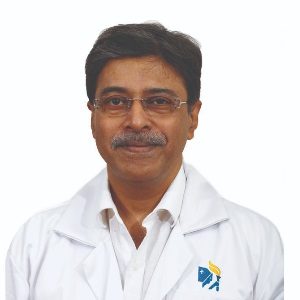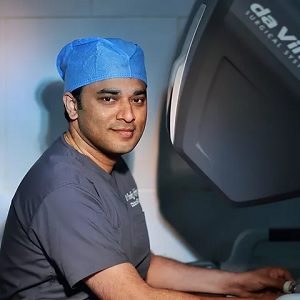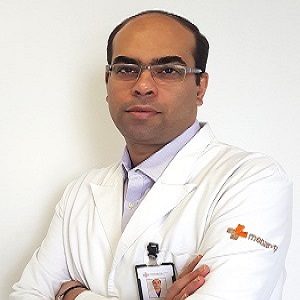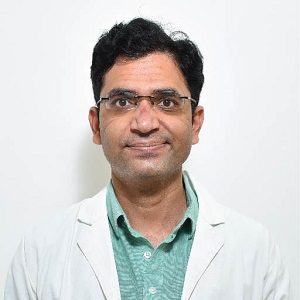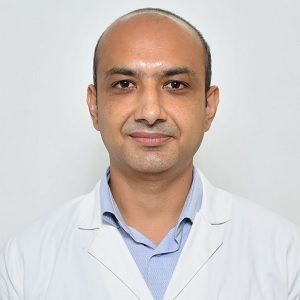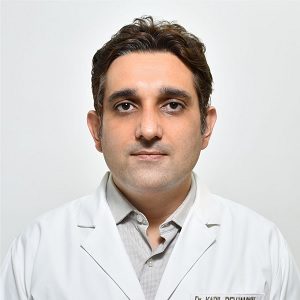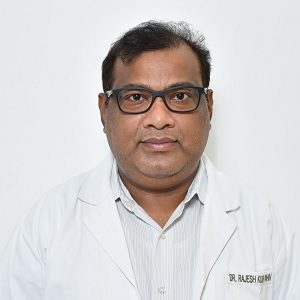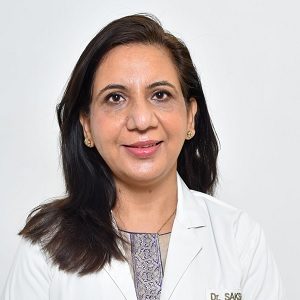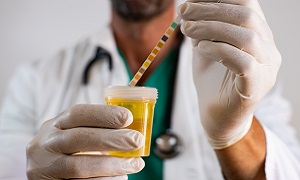Best Doctors in India for Bowel Obstruction Treatment
- Liver Transplant Surgeon and HPB Surgeon, Chennai, India
- Over 15 years’ experience
Profile Highlights:
- Dr. Selvakumar Naganathan is one of the best liver transplant surgeons in India with nearly 15 years of experience.
- He has carried out more than 2000 procedures, including 300 donor & 500 recipient hepatectomies, cadaver transplantations, retrieval of cadaver livers, and live donor liver transplants.
- He also established many liver transplantation centers across India & other countries.
- General Surgeon and Surgical Gastroenterologist, Chennai, India
- Over 27 years’ experience
Profile Highlights:
- Dr. Raghunath K J is a well-known name in the field of general surgery with an experience of more than 27 years.
- He went under training in advanced Laparoscopic surgery from Canada and France.
- Dr. Raghunath pioneers many prestigious projects in the UK.
- Dr. Raghunath has a specialized interest in Gall Bladder Stone treatment, Hernia, GI Cancer Surgery, Laparoscopic Sleeve Resection, Endoscopic Surgery, etc.
- Colorectal Surgeon and Robotic Surgeon, Chennai, India
- Over 26 years’ experience
Profile Highlights:
- Dr. Venkatesh Munikrishnan is one of the best Gastroenterologists and Colorectal Surgeons in Chennai, having 21 years of experience in managing disorders that need surgical treatment.
- Dr. Munikrishnan specializes in surgical oncology, endoscopy, Gastritis Treatment, etc.
- He is also active in research; one of his research on CT Colonography fetched a grant from Bracco, Milan, Italy.
- GI Surgeon and Liver Transplant Surgeon, Gurugram, India
- Over 20 years’ experience
Profile Highlights:
- Dr. Amit Nath Rastogi is a pioneer in the field of liver transplant surgery. He completed his fellowship in liver transplant surgery at Sir Gangaram hospital while being a part of the largest liver transplant program in the country.
- Furthermore, he received his training in robotic liver surgery from IRCAD -Strasbourg, France, and advanced robotic HPB training from Grosseto.
- Liver Transplant Surgeon, Gurugram, India
- Over 10 years’ experience
Profile Highlights:
- Dr. Prashant Vilas Bhangui is one of the highly trained liver transplant specialists who received his training in Surgical Gastroenterology and Liver Transplantation.
- He also holds a European Inter-University Diploma in Hepato-Biliary-Pancreatic Cancers.
- Dr. Prashant is further interested to work in certain fields which include hepatocellular carcinoma, colorectal liver metastases, and living donor liver transplantation. Besides this, he has also published several journals on these subjects.
- Gastroenterologist, Gurugram, India
- Over 7 years’ experience
Profile Highlights:
- Dr. Abhinandan Mishra is one of the young Gastroenterology doctors in Gurugram who is particularly interested in inflammatory bowel disease treatment.
- Dr. Abhinandan Mishra offers Endoscopic Retrograde Cholangiopancreatography, Ascites tap, Endoscopy, Peroral Endoscopic Myotomy, Capsule Endoscopy, Esophageal Manometry, Magnetic Resonance Cholangiopancreatography, etc.
- Gastroenterologist, Gurugram, India
- Over 18 years’ experience
Profile Highlights:
- Dr. Atul Sharma is a renowned Gastroenterology practitioner in Gurugram and is particularly interested in Third Space Endoscopy and Per Oral Endoscopic Myotomy (POEM).
- He presented several papers on Manometry, Luminal gastroenterology, and interventional Gastroenterology during training in Advanced Interventional GI Endoscopy.
- Gastroenterologist, Gurugram, India
- Over 15 years’ experience
Profile Highlights:
- Dr. Kapil Jamwal is a renowned GI practitioner in Gurugram with an extensive experience in digestive and liver disease.
- The specialist offers treatment for Hepatitis B, Jaundice, Hepatitis C, Inflammatory Bowel Syndrome, Acute Pancreatitis, Liver Diseases, and Irritable Bowel Syndrome.
- Gastroenterologist, Gurugram, India
- Over 18 years’ experience
Profile Highlights:
- Dr. Rajesh Padhan is a renowned Gastroenterologist in Gurugram with an extensive experience of more than 18 years in the field.
- He is skilled in carrying out various endoscopy procedures such as Colonoscopy, Endoscopic retrograde cholangiopancreatography, Endoscopic ultrasound, upper GI endoscopy, etc.
- Gastroenterologist, Hepatologist, Gurugram, India
- Over 25 years’ experience
Profile Highlights:
- Dr. Sakshi Karkra is one of the best Pediatric gastroenterologists in Gurugram.
- She has special interest/ expertise in Colonoscopy, Upper GI Endoscopy, Capsule endoscopy, Enteroscopy, Endoscopic variceal ligation, Foreign body removal, Stricture & achalasia dilatation, Polypectomy, Anal manometry, Liver Biopsy, and Colonic manometry.
Best Hospitals in India for Bowel Obstruction Treatment
BOWEL OBSTRUCTION
Bowel obstruction is a condition that creates a blockage in your small or large intestine. Several reasons might be the cause of this potentially dangerous condition. People having a full obstruction can find difficulty in passing stool or gas, if not impossible.
It can be total or partial, depending on whether any contents are able to pass through the obstructed area. A partial obstruction can also cause diarrhea.
An obstruction can lead to a buildup of food, gas, gastric acids, and fluids, as these continue to build up, the pressure increases. This can result in a rupture or a split. Whatever was behind the blockage might enter the abdominal cavity, and spread bacteria, which might even be fatal.
Symptoms
Generally, the symptoms of bowel obstructions are quite distressing and painful. Some of the symptoms include:
- vomiting
- bloating
- inability to pass stools or gas
- nausea
- severe pain
- diarrhea
- constipation
- cramping
- decreased appetite
- swollen belly
The early signs are usually vomiting and diarrhea. If you recognize these symptoms, this means that you will be able to seek treatment before the condition progresses any further.
If you experience fever, after any of these symptoms, then you should speak to a doctor, as it can be a sign of a split in the bowel.
Causes
There might be several causes that might lead to your bowels getting blocked. Some of these include the following:
- Part of your bowel might get twisted, due to which it can get closed off and thus, keep anything from passing through.
- It can get inflamed sometimes and even swell up.
- A tumor or other such type of growth inside your bowel might also cause the blockage
- Part of the intestine can also slide into a different part like a telescope
- Scar tissue or hernia may also make the bowel too narrow for anything to pass through it
- Damaged blood vessels leading to the bowel might also cause some bowel tissue to die
Diagnosis
In order to diagnose bowel obstruction, your doctor will need to ask you about your medical history, including if you have experienced constipation, or if you have had cancer, as well as what new symptoms you have experienced. He/she might also need to:
Physical exam
Do a physical exam in order to see if you have any pain in your belly, or if they can feel a lump in your belly, or if you’re able to pass gas
Urine tests
Blood tests
CT scan or an X-ray
Order a CT scan or an X-ray in order to look for blockages
Barium enema
They’ll put a special liquid that contains barium, i.e. a whitish-silver metal into your rectum. This liquid is going to spread into your bowels and show on an X-ray as a bright area. If there’s a blockage, the barium is going to show it.
Treatment
Treatment for this condition depends on the cause and how severe your blockage is. Generally, total mechanical obstruction requires surgery. Most cases of bowel obstruction also need some type of medical intervention.
For bowel obstruction, treatment options can include:
Medication
Observation
Ileus can need a few days of monitoring, and often resolves with time. During this time, people need to limit their intake of food and drink in order to stop further buildup. Doctors can also provide fluid intravenously for keeping people hydrated.
Surgery
Nasogastric tube
Nasogastric tube is a narrow tube that goes up your nose and further into your stomach. It can help in the removal of fluid and gas which are trapped in the stomach, thus relieving pressure. This can ease your pain and vomiting.
Therapeutic enema
Medication can also help ease discomfort caused by a bowel obstruction. This might include:
- Antinausea medicines for the prevention of vomiting
- Pain relief medication
- Antibiotics for fighting against bacterial infection
Complications
A bowel obstruction may lead to several other issues, including:
- dehydration
- electrolyte imbalance
- kidney failure
- a hole in the bowel, which might cause infection
- tissue death in the bowels
- abscess within the abdomen
- sepsis, a potentially fatal blood infection
- pulmonary aspiration, wherein a person inhales solids such as vomit
If you have had surgery in the past for obstructions, you are also at risk of a few complications, which includes:
- Adhesions
- Short bowel syndrome, a condition in which part of the bowel is lost or does not work in a proper way
- Wound reopening
- Bowel paralysis
- Nerve damage
A bowel obstruction might also interrupt blood flow in the area. This can also cause some of the complications which are listed above.
It can also cause multiple organ failure, and at worst, death. Therefore, it is quite important to treat bowel obstruction as early as possible.


